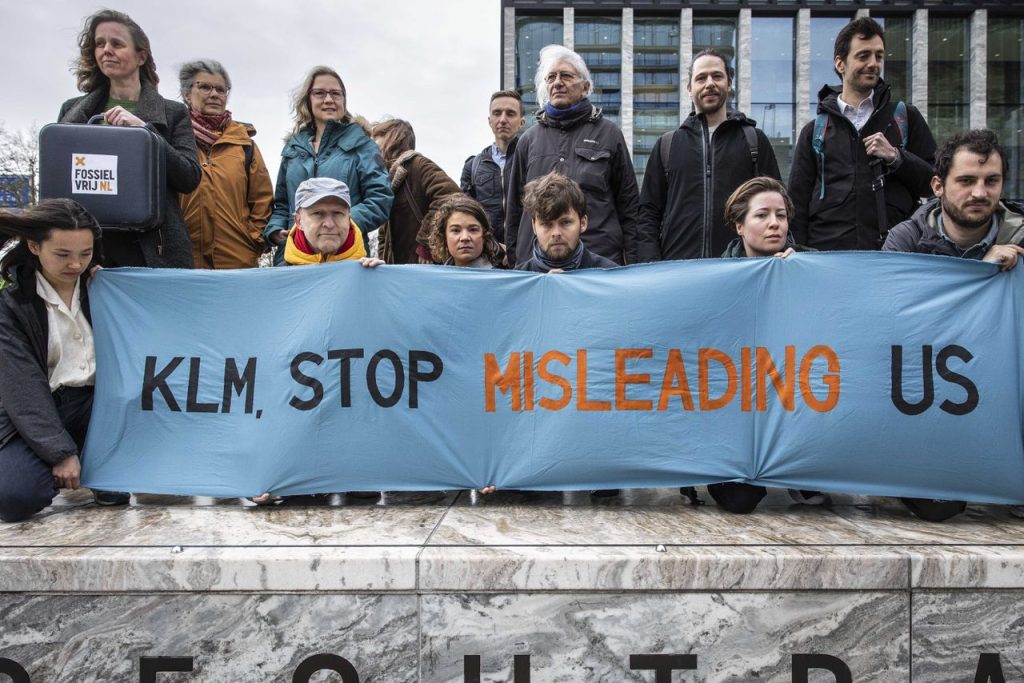- The Dutch court has stated that KLM's advertising about sustainability violated EU consumer law.
- The ruling creates a new standard for the aviation industry and claims regarding the Paris Agreement commitments and 'offsetting'.
- Fossielvrij and Reclame Fossielvrij are asking for a ban on advertisements for fossil fuels.
The District Court of Amsterdam has declared KLM's misleading advertising about being environmentally friendly illegal, which sets a significant legal example for the global aviation sector and companies proclaiming their dedication to the Paris Agreement.
The judge concluded that KLM's statements suggesting that flying is becoming sustainable, and claims that its 'offsetting' products compensate for the climate impact of flying are deceptive and thus illegal.
KLM's assertions that it was 'committed to the Paris Agreement climate goals' also violated the law, as claims about the feasibility of KLM's targets paint 'too rosy a picture' given the limited measures the airline is employing. This decision will establish a precedent for all companies promoting net zero commitments, and their public relations firms and advertising agencies should also take note.
Hiske Arts, campaigner for Fossielvrij, one of the campaign groups that brought the lawsuit, said: “Today’s judgment is a landmark victory in the fight against greenwashing. The significance of the Court’s decision is clear: companies are not allowed to claim they are tackling dangerous climate change when in reality they are fuelling the crisis. KLM’s “green” marketing creates a misplaced trust that even if you are worried about the climate crisis, you can board a plane reassured you are not harming the planet. The judges have put an end to this harmful strategy to lull the public and politicians to sleep.”
Dutch campaigners Fossielvrij and Reclame Fossielvrij – with support from environmental law charity ClientEarth – filed the claim in July 2022, marking the first lawsuit worldwide to tackle aviation industry greenwashing. It alleged the airline’s marketing breached the EU Unfair Commercial Practices Directive.
Johnny White, lawyer at ClientEarth, said: “Companies that publicly advertise commitments to the climate goals of the Paris Agreement must now ensure that those claims are feasible and concrete, or risk losing in Court. This judgment is nothing short of a wake-up call for highly polluting industries and companies that try to sell the image of commitment to the Paris climate goals without having the plans to get there. It leaves the airline industry’s climate PR strategy dead in the water.”
Sustainable aviation fuels & ‘offsets’
The Court stated that using the term “sustainable” to describe alternative aviation fuels (known as SAF by the industry) is too absolute and not specific enough to be promoted as a promising solution to aviation’s emissions. Specifically, it found: “At the moment, SAF’s share in total fuel consumption (and thus CO2 emissions reduction) is still very limited due to various reasons. A more substantial share can only be expected in the distant future, and thus uncertain. The expression is therefore misleading.
The Court ruled on KLM’s promotions regarding customers' efforts to ‘offset’ the climate impact of their flights by paying for reforestation. The Court noted that there is no direct connection between customers’ contributions and the impact of CO2 emissions from the flight.
White stated: “The reality has always been that ‘sustainable aviation fuels’ or ‘offsetting’ products could end up justifying more emissions than they can save. All airlines and companies making claims about their products’ environmental impacts based on offsetting should take caution from this ruling.”
KLM had retracted the advertising claims disputed in response to the lawsuit. Therefore, the Court did not see a need to issue further orders as requested by the claimants, and it determined that a ban on similar claims in the future was too uncertain. The decision suggests that public judgment alone should suffice. However, because the Court ruled largely against KLM, it instructed the company to cover the claimants’ costs.
Fossil fuel ad ban
The organizations are advocating for a ban on advertising fossil-fuel based products, likening the significant harm caused by these products to people’s health and livelihoods due to contributing to dangerous climate change.
Rosanne Rootert, campaigner at Fossielvrij Reclame, remarked: “Addressing greenwashing is currently like a game of cat-and-mouse. Just when one deceptive campaign is halted, ten more appear. One can only react after the damage is already done: people have already seen the ads. A complete prohibition on fossil advertising, such as for air travel, is the only way to truly prevent companies from engaging in greenwashing. Lawsuits like this would then become unnecessary.”
The ruling from the District Court of Amsterdam is likely to set a precedent for future cases. The issues raised in the lawsuit have already been brought to the attention of the European umbrella consumer organization BEUC in a complaint that covers the entire EU region revealing misleading sustainability claims made by 17 European airlines.
Dimitri Vergne, Head of Energy and Sustainability at BEUC, commented: “Technological solutions to reduce carbon emissions from aviation won’t be widely available anytime soon, so airlines portraying flying as a sustainable mode of transport are essentially deceiving consumers.
“The Court’s decision acknowledges that green flying is a false impression and represents a turning point for consumer protection against misleading aviation advertising. The rest of the airline industry should view the Court’s decision as a strong warning. They must cease their deceptive marketing immediately, as we communicated to the EU authorities last year.”



